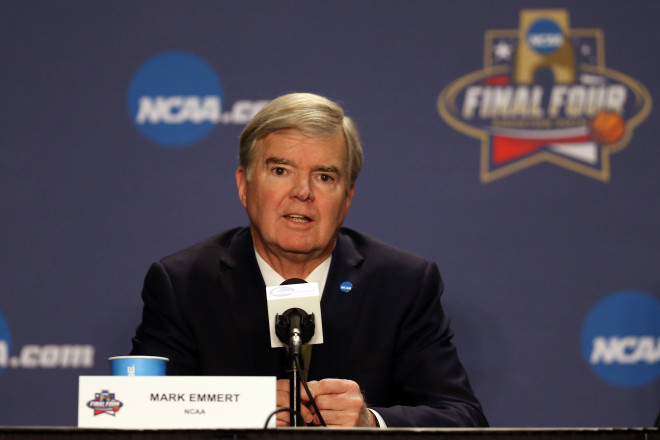Analyst Roundtable: NCAA rules debate
The Rivals analyst roundtable returns as our team of experts gives their takes on three topics related to NCAA rules and possible changes.

1. Is it a good thing that the NCAA is reportedly considering giving more power to schools/conferences in redefining recruiting rules?
I’m all for it. I find it hard to have a strong opinion about restricting schools on the recruiting trail. I understand the need to limit communication in the interest of not driving student-athletes insane, but evaluation periods and timeframes for official visits seem largely inconsequential to me. As long as the rules are the same for everyone, I’m not sure it much matters how the recruiting process unfolds. - Southeast analyst Rob Cassidy
I think it's good as long as all of the FBS programs have to abide by the same changes. You can't have early official visits for one conference and not another. The NCAA hasn't done a great job of making sweeping changes that need to be made but I also can't see this happening if all the conferences need to agree, but that's the only fair way. – National Recruiting Director Mike Farrell
Probably. The recruitment process will likely get simplified by making what most view as common sense changes but I don't believe it will stop schools from verbally offering prospects at a younger and younger age. Don't be shocked if we see an early signing period and official visits being taken before players get to their senior seasons. – Mid-Atlantic analyst, Adam Friedman
It's a difficult question. On the one hand, I like the idea of conferences setting their own rules to benefit their member institutions in ways they see fit. If Big 10 schools want to do things differently in terms of official visits or an early signing period than, say, the SEC then they should be able to make their own choices. On the other hand, everybody should play by the same rules. Everybody, whether in Los Angeles or Lincoln, is in the same organization and should abide by the same standards. I lean toward the latter because it simplifies everything for prospects and their parents so everyone can work off the same rules. – National recruiting analyst Adam Gorney
Schools/Conference are always going to do what's in their own best interest. They can talk all day long about looking out for the prospective student-athlete, but it will never go down that way. The unlimited texting rule is a clear example of that - it benefits the schools while negatively affecting the PSA. Schools/Conferences should have a spot at the table, but prospective student-athletes need representation as well. More power to the schools/conferences will adversely affect PSAs unless there is a commensurate increase in their contribution to the discussion. – Midwest analyst Josh Helmholdt
The term ‘Power Five’ for the conferences is more far-reaching than it’s often used as. Conference commissioners shape the rule changes and we saw with the satellite camp debate that the demands of conferences initiate change. In terms of the Power Five conferences creating more opportunity for football programs to connect with players and their families, I think that this is a necessity since many more schools are recruiting on a national level now, or at the very least, recruiting well beyond their traditional regional landscape. It’s up to the conferences and teams to speak up for themselves as to how much leeway they want to give themselves to keep up with everyone else. - Texas analyst Nick Krueger
I think there are some common sense things that can come out of these type of freedoms but it also opens the door for some radical changes. The problem with letting schools set their own rules is that the rules will likely favor schools and not prospects. – Southeast analyst Woody Wommack
2. What would be the one rule you would change in regards to recruiting?
I’ve always been in favor of an early signing period. Would it fix everything? No way. Not even close, but it would eliminate some of these early commitments that everyone knows have no chance of sticking from the jump. It’s gotten to the point that some verbal commitments barely merit coverage because observing it is obviously an exercise in futility. When a sophomore “commits” to a school he’s never visited, is it actually news? An early signing period would, at the least, cut down on some of that. - Southeast analyst Rob Cassidy
Make offers not only in writing but commit table in writing. So if you want to offer a 9th grader, he has the option to sign a binding letter right then and there. You'd see all these bogus offers go out the window immediately. – National Recruiting Director Mike Farrell
I'd love to see college coaches back at camps like the Rivals Camp Series. Every coach in America wants to have more opportunities to scout players in person and it would really help players that don't have the means to visit or camp at dozens of schools. – Mid-Atlantic analyst Adam Friedman
I would allow college coaches to attend camps. An evaluation period when college coaches could actually see these guys run around and work out could be so valuable to them and give coaches a much fuller understanding of the prospects they're recruiting. More interaction, more face time, not less, is invaluable when determining which recruits fit your program. Why can a college basketball coach sit and watch AAU events all summer but a college football coach cannot watch the players they're recruiting at events in the offseason? – National recruiting analyst Adam Gorney
I only get one? Then, definitely earlier official visits. When I checked last August, 60 percent of the Rivals250 were already committed when the first weekend arrived for them to take official visits. And, these are the prospects who usually wait the longest. Had I included all three-stars, I fully expect the percentage would have been higher. Official visits give prospects the resources to make more informed decisions, and I believe earlier official visits will have a significant impact on curtailing the number of de-commitments we are seeing later in the process. – Midwest analyst Josh Helmholdt
This is more of a personal annoyance, but now since coaches essentially have unlimited digital contact with recruits, do they have to keep going to the old trick of sending kids 100 letters in the mail all at once? I say let’s make it one or the other. Do you know what happens when one person sends me 100 emails all at once? It defaults into my spam folder. - Texas analyst Nick Krueger
I don't think it would be a bad idea for official visits to be taken during the spring or summer prior to a prospect's senior year, especially if that prospect is planning on enrolling early. – Southeast analyst Woody Wommack
3. What is one highly debated NCAA recruiting rule with which you agree?

I don’t have a problem with satellite camps. I’m not sure they’re incredibly effective, but if coaches want to spend more time traveling and working in the summer, so be it. How much it helps student-athletes is certainly up for debate, but it certainly doesn’t hurt them. That much is clear. The only things these camps hurt are the social schedules of college coaches. And, hey, nobody’s forcing them to hold them. - Southeast analyst Rob Cassidy
People freak out about satellite camps and I get it to an extent but it was never a big deal until Jim Harbaugh decided to put them on steroids. I guess if he wants to do that then let him, but staff attrition will occur if you burn these guys out with 30 or more camps – National Recruiting Director Mike Farrell
The rule that protects players the most is not being allowed to talk to players in person until their season year. Constantly pulling a player out of class to meet with college coaches for what would likely be extended meetings would severely impact that player's GPA and ability to qualify academically. That's one thing I think the NCAA got right. – Mid-Atlantic analyst Adam Friedman
I'm against an early signing period and I hope it stays that way. Everybody bemoans the pace of recruiting and how early it's happening now. Well, you want it pushed up even further? And to compel kids to sign early? It's not as simple as "Kids can wait until the late signing period." There will be coaches who pressure kids to lock them in early and there will be prospects who feel compelled to hurry up and sign or possibly lose their spot. When will official visits happen? Will recruits get the full picture of the recruiting landscape? I just don't think it's a good idea, there are too many unconsidered issues when people say an early signing period would cure all the ills in football recruiting. – National recruiting analyst Adam Gorney
I am in favor of satellite camps. Taking them away would further divide the haves from the have-nots in college football, and increases the balance of power in the direction of southeastern schools. Of course, schools are now wildly out-of-control with their satellite camp scheduling. That is less than ideal, but still better than a full ban. I expect some controls will eventually be put on satellite camps - either by NCAA edict or the coaches will just burn themselves out and it will happen naturally. – Midwest analyst Josh Helmholdt
NCAA Bylaw 13.1.9 states that institutional staff members may only attend funerals of perspective athletes that have signed Letters of Intent or financial aid agreements, provided that no recruiting takes place with other potential athletes that may be in attendance. I don’t know what the impetus of this rule was, but let’s all pretend that it didn’t stem from some coach offering a player while said player is mourning a friend at his funeral. - Texas analyst Nick Krueger
I know most people think there should be an early signing period, but personally I like having one signing period following the conclusion of senior seasons. If anything I think it should be pushed back a few weeks. Signing Day is essentially the draft for colleges and it's good for the sport to have a showcase day like that during the offseason. – Southeast analyst Woody Wommack